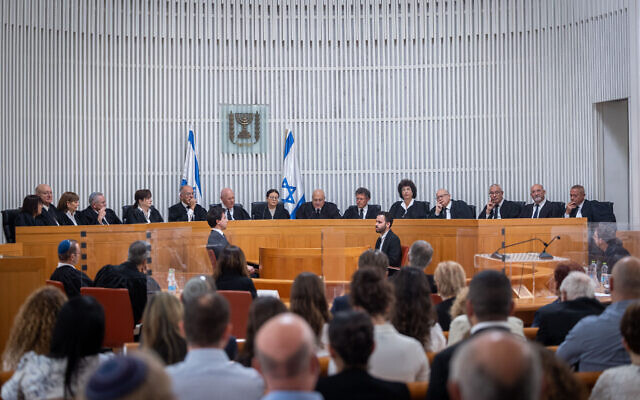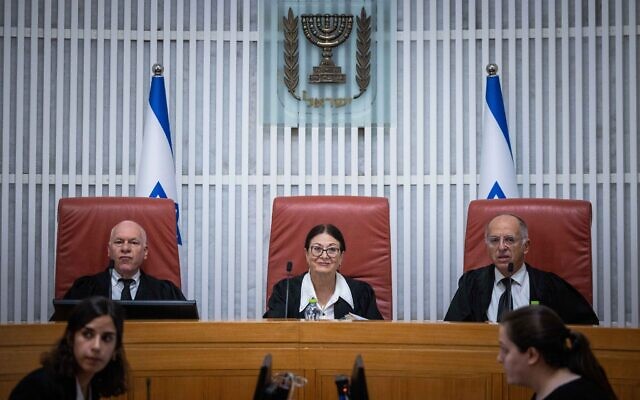Experts warn against planned bill, warning it will place all rights in the hands of the governing majority; official warns int’l bodies could intervene if top court compromised

Over 100 law professors and lecturers across Israel’s universities and academic institutions published a letter this week opposing a proposed bill that would allow the Knesset to override High Court of Justice rulings. The bill, championed by many in the incoming government coalition, would drastically restrict the justices’ capacity to intervene in Knesset legislation and government decisions.
The legal professionals said that the proposed override clause “will seriously damage the protection of human rights in Israel and will be a cry [heard] for generations.”
The far-right and ultra-Orthodox parties in prime minister-designate Benjamin Netanyahu’s bloc of supporters — which won a 64-member majority in the 120-seat Knesset in the election earlier this month, and are expected to form Israel’s most right-wing government ever — have been demanding that legislation be passed that would allow any 61 lawmakers to overrule decisions by the country’s top court, a demand critics warn could upend Israel’s democratic system of balance between the parliament, the executive and the judiciary. The demand is also backed by many in Netanyahu’s own Likud party.
The signatories to the letter are lecturers from law faculties at the Hebrew University of Jerusalem, Tel Aviv University, the University of Haifa, Reichman University in Herzliya, and Sapir College, among others.
In their letter, they urged the incoming coalition not to pass the bill as planned, warning that it would place all rights in the hands of the ruling political majority.
The proposed bill will “transform the citizens of Israel from citizens with rights, whom the Knesset must respect and the court protects, to those who are subject to the mercy of the political majority at any given moment.”

If the bill passes, they said, the Knesset could — with a simple majority — impose movement restrictions on people, approve surveillance, ban demonstrations, or harm religious freedom and equality, all without legal supervision and judicial review, according to a Channel 13 report that cited the letter.
The lecturers said their call stemmed from concern for the human rights of all Israeli citizens, and a recognition that, if enacted, the legislation would be hard to walk back.
On Wednesday, an unnamed legal official cited by Channel 13 said the bill could expose Israel’s political echelon to legal vulnerabilities abroad.
If the independence of Israel’s judiciary is weakened or compromised and its work undermined, Israeli politicians could be opening themselves up to potential investigations in various countries around the world and even international tribunals, said the official.
The warning came as the US Federal Bureau of Investigation announced it was launching an investigation into the killing of Palestinian-American journalist Shireen Abu Akleh, apparently by an Israeli soldier earlier this year. An Israeli military investigation found that she was hit by a bullet likely shot by an Israeli soldier, by mistake. The Palestinian Authority has alleged that she was targeted.
The US decision represents an about-face after the Biden administration insisted for months that it would not be opening its own investigation, instead relying on probes conducted by the Israeli and Palestinian authorities. It had also accepted the Israeli conclusion.
The court
In a landmark ruling in 1995, the High Court asserted that the Basic Law: Human Dignity and Liberty, approved in 1992 by a simple majority, had semi-constitutional status and that the court could therefore annul laws passed by the Knesset if they were incommensurate with that Basic Law.
Since then, it has annulled 22 laws or clauses on this basis, and reversed numerous government resolutions and administrative rulings which it deemed also violated the principles of the Basic Laws.
These rulings have dealt with some of the most fundamental issues of human rights and the rule of law in Israel, including democratic conduct in the Knesset, freedom of assembly and protest, the indefinite detention of asylum seekers and migrants, property rights including those of Palestinians in the West Bank, and critical religion and state issues.
The court ruled against key policies of the predominantly right-wing, religious governments led by Netanyahu from 2009 to 2021, which generated cries among his allies to rein in what they saw as an increasingly activist court defying the will of the legislature, and by extension the Israeli majority which elected it.

This issue of limiting the court’s power has developed over the last quarter of a century into a substantive point of dispute, first between the right and left and today between what might more accurately be described as the populist and liberal democratic camps.
This week, the Sephardic chief rabbi of Israel, Rabbi Yitzhak Yosef, drew ire and accusations of political intervention when he backed a demand by ultra-Orthodox parties that Netanyahu’s prospective government pass the override bill.
Israel’s Haredi community leaders have long deplored some High Court rulings, such as those recognizing non-Orthodox Jewish streams and a ruling requiring the state to equally enlist ultra-Orthodox youth to the army.
In his Saturday sermon, Yosef said the so-called override bill was “an opportunity to amend the law on who is a Jew.”
“There has never before been such government, with 32 religious and ultra-Orthodox Knesset members. Maybe there is an opportunity to amend the law on who is a Jew? Don’t know if it’s possible. To fix things. Now is the opportunity to make amends,” he said.
That was a reference to reported efforts by members of the likely next government to change the Law of Return, a landmark piece of legislation that allows all Jews and people with a Jewish parent or grandparent to immigrate to Israel. The far-right Religious Zionism party and the ultra-Orthodox United Torah Judaism and Shas parties have demanded the removal of the “grandchild clause,” thereby limiting immigration only to people born to Jewish parents or who have converted to Judaism.
Though not a new one, this proposal would mark a profound change to a rule that has been around for more than five decades, dramatically reducing immigration to Israel and potentially sparking a bitter fight with major international Jewish groups, like the Jewish Agency, which support the Law of Return in its current form.
As reported by The Times of Israel
